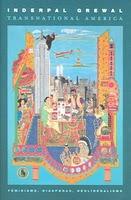Transnational America: Feminisms, Diasporas, Neoliberalisms

Much like restorative criminology, the new transnationalism is not a single-variant explanation of the world. Grewal destroys that line of thought when she shows cultural imperialism through the lens of feminism, class, and much more. While the basis of her argument is that becoming "American" is evidence of a hegemonic culture, what really brings this argument salience is the expansion she does of the implications regarding it. This does not only mean that individuals will be given "honorary whiteness" for service to the white patriarchy in charge of the country, but rather that the system of Americanism is largely out of the hands of this same captains of industry. The invisible hand of the economy has more to gain from under-paid and under-benefited Indian workers than trying to keep a certain race in power. Thus, while white male leaders might benefit, this transnationalism necessarily breaks down any ties of racial solidarity that whites or other races may have. Grewal does an excellent job of pushing that point through her book, which is written in a clear, formal style that is enriched by the continual ties that she has with South Asia (specifically India). This is not the mental padding that usually is the key creator of academic inertia, but rather a completely new line of reasoning that will undoubtedly be the topic of much discussion in the decades to come.